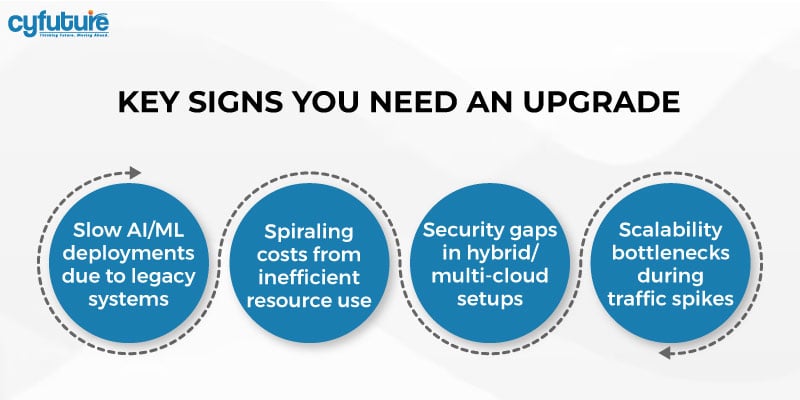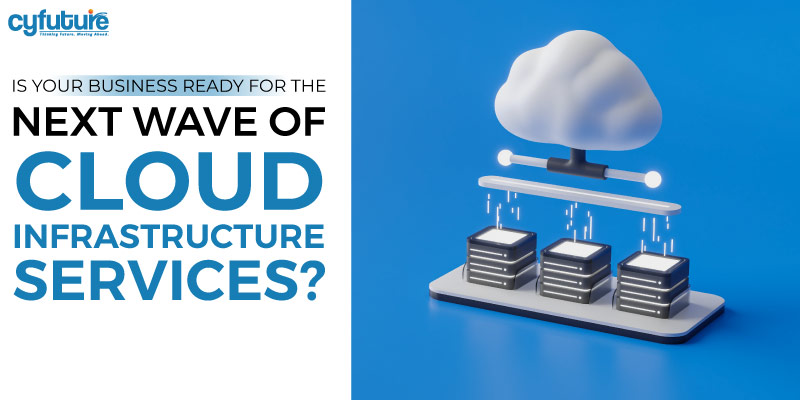 1187 Views
1187 Views
The digital transformation era is accelerating, and businesses are increasingly relying on cloud infrastructure services to stay competitive. As technology evolves, the next wave of cloud computing promises greater scalability, security, and efficiency. But is your business prepared to leverage these advancements?
In this blog, we will explore the emerging trends in cloud infrastructure services, the benefits they offer, and how your organization can future-proof its IT strategy. Whether you’re a startup or an enterprise, understanding these developments will help you make informed decisions about your cloud adoption journey.
The Evolution of Cloud Infrastructure Services
Cloud computing has come a long way from basic storage solutions to sophisticated, AI-driven platforms. The next wave of cloud infrastructure services introduces innovations such as:
1. Hybrid and Multi-Cloud Environments
What it means:
- Businesses no longer rely on just one cloud provider (like AWS or Azure).
- Hybrid cloud = Mix of private (on-premises/self-managed) and public cloud (AWS, Google Cloud).
- Multi-cloud = Using multiple public cloud providers (e.g., AWS + Azure + Google Cloud).
Why it matters:
Performance Optimization – Run workloads where they perform best.
Cost Efficiency – Avoid vendor lock-in and leverage competitive pricing.
Compliance & Risk Management – Store sensitive data in private clouds while using public clouds for scalability.
2. Edge Computing Integration
What it means:
- Traditional cloud computing processes data in centralized data centers.
- Edge computing processes data closer to where it’s generated (e.g., IoT devices, sensors, smartphones).
- Cloud providers now offer edge-optimized services (e.g., AWS Outposts, Azure Edge Zones).
Why it matters:
Reduces Latency – Critical for real-time apps (autonomous vehicles, AR/VR, industrial IoT).
Bandwidth Savings – Less data sent to central clouds = lower costs.
Offline Capabilities – Devices can function even with poor connectivity.
3. AI and Machine Learning in the Cloud
What it means:
- Cloud platforms now embed AI/ML tools (e.g., AWS SageMaker, Google Vertex AI).
- Businesses can automate tasks, improve security, and gain predictive insights without building AI from scratch.
Why it matters:
Smarter Automation – AI can auto-scale resources, detect anomalies, and optimize workflows.
Enhanced Security – AI-powered threat detection (e.g., identifying unusual login attempts).
Predictive Analytics – Forecast demand, customer behavior, and maintenance needs.
4. Serverless Computing
What it means:
- Traditional cloud requires managing virtual servers (even if auto-scaling is used).
- Serverless (e.g., AWS Lambda, Azure Functions) = Developers only write code; the cloud handles execution, scaling, and maintenance.
Why it matters:
No Server Management – Zero infrastructure overhead.
Pay-Per-Use Pricing – Costs are based on actual usage, not idle servers.
Instant Scalability – Automatically handles traffic spikes.
5. Enhanced Security & Compliance
What it means:
-
Cyber threats are growing, so cloud providers now offer:
- Zero Trust Security – No user/device is trusted by default; continuous verification.
- Advanced Encryption – Data is protected at rest and in transit.
- Automated Compliance – Tools to ensure adherence to GDPR, HIPAA, etc.
Why it matters:
Prevents Data Breaches – AI-driven threat detection + encryption.
Simplifies Audits – Automated compliance reporting.
Global Regulations Support – Easily adapt to regional laws.

Why Businesses Must Upgrade Their Cloud Strategy
1. Scalability and Flexibility
Traditional IT infrastructure struggles to handle sudden spikes in demand. Modern cloud infrastructure services provide auto-scaling capabilities, ensuring seamless performance during peak loads without over-provisioning resources.
2. Cost Efficiency
Cloud computing follows a pay-as-you-go model, reducing capital expenditure on physical hardware. Additionally, advancements in cloud infrastructure services optimize resource allocation, further cutting costs.
3. Improved Security Posture
Cybersecurity threats are evolving, and outdated security measures are no longer sufficient. Leading cloud providers offer built-in security features like:
- AI-driven threat detection
- End-to-end encryption
- Identity and access management (IAM)
- Compliance with global regulations (GDPR, HIPAA, etc.)
4. Business Continuity and Disaster Recovery
Downtime can be catastrophic for businesses. Cloud-based disaster recovery solutions ensure rapid data restoration and minimal disruption in case of outages or cyberattacks.
5. Competitive Advantage
Early adopters of advanced cloud infrastructure services gain a technological edge. From faster deployment cycles to AI-powered insights, the cloud enables innovation at scale.
Key Considerations Before Migrating to Next-Gen Cloud Infrastructure
While the benefits are compelling, businesses must assess their readiness before transitioning. Here are some critical factors to consider:
1. Assessing Current IT Infrastructure
- Is your existing infrastructure compatible with cloud environments?
- Do you have legacy systems that require modernization?
2. Choosing the Right Cloud Model
- Public Cloud – Best for scalability and cost efficiency (e.g., AWS, Azure, Google Cloud).
- Private Cloud – Ideal for businesses needing enhanced security and control.
- Hybrid Cloud – Combines the benefits of both public and private clouds.
3. Security and Compliance Needs
- Does your industry have strict compliance requirements?
- How will you manage data sovereignty in a multi-cloud setup?
4. Cost Management and Optimization
- Implement FinOps (Cloud Financial Management) to track and optimize cloud spending.
- Use reserved instances or spot instances to reduce costs.
5. Workforce Readiness
- Do your IT teams have the necessary cloud skills?
- Should you invest in cloud training or hire specialized talent?
How CyFuture Can Help Your Business Embrace Next-Gen Cloud Infrastructure Services
This section is a service pitch from CyFuture, highlighting how they assist businesses in adopting advanced cloud infrastructure services. Here’s a breakdown of what it means:
1. Understanding the Challenge
-
“Migrating to advanced cloud infrastructure services can be complex.”
- Moving to the cloud isn’t just a simple switch—it involves planning, security, cost management, and technical expertise. Many businesses struggle with legacy systems, security risks, and downtime during migration.
2. CyFuture’s Solution: End-to-End Cloud Services
-
“Our end-to-end cloud solutions help businesses transition smoothly while maximizing ROI.”
- CyFuture provides comprehensive support, from initial migration to ongoing management, ensuring businesses get the best return on investment (ROI) from their cloud adoption.
3. Key Offerings
CyFuture offers specialized services to address different cloud needs:
Cloud Migration Services
- What it means: Moving from on-premises (physical servers) to the cloud without major disruptions.
- Why it matters: Minimizes downtime, ensuring business operations continue smoothly.
Managed Cloud Services
- What it means: 24/7 monitoring, security updates, and performance optimization.
- Why it matters: Businesses don’t need in-house experts—CyFuture handles everything, ensuring reliability and security.
Multi-Cloud & Hybrid Cloud Solutions
- What it means: Using multiple cloud providers (AWS, Azure, Google Cloud) or combining public + private clouds.
- Why it matters: Avoids vendor lock-in, improves flexibility, and optimizes costs.
Cloud Security & Compliance
- What it means: Protects data with enterprise-grade security (encryption, access controls) and ensures compliance with laws like GDPR, HIPAA.
- Why it matters: Prevents breaches and avoids legal penalties.
AI & DevOps Integration
- What it means: Automating software development (CI/CD pipelines) and integrating AI for smarter operations.
- Why it matters: Faster deployments, fewer errors, and better innovation.
4. The Value Proposition
-
“With CyFuture as your cloud partner, you can future-proof your business.”
-
By leveraging CyFuture’s expertise, businesses can:
- Stay competitive with the latest cloud tech.
- Reduce risks of failed migrations or security flaws.
- Scale effortlessly as business needs grow.
This section positions CyFuture as a trusted partner that simplifies cloud adoption, ensuring businesses get security, efficiency, and innovation without the headaches of managing it alone.

Conclusion
The next wave of cloud infrastructure services is reshaping how businesses operate, offering unprecedented agility, security, and efficiency. Companies that embrace these advancements will thrive, while those lagging behind risk losing their competitive edge.
Is your business ready? If not, now is the time to strategize and partner with experts like Cyfuture to unlock the full potential of the cloud.
Take the leap into the future of cloud computing—contact Cyfuture today!
Related Posts in This Category

